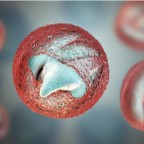
General Information
Cryptosporidiosis (or “Crypto” for short) is a disease that causes watery diarrhea. It is caused by microscopic germs—parasites- called Cryptosporidium. It is found primarily in contaminated water, including swimming pools, recreational water and drinking water. Drinking contaminated water is the primary source of exposure. Exposure to soil, as well as farm animals, could also expose humans to Crypto. Exposure can also occur by eating food contaminated by an infected food handler who has not performed effective hand hygiene after a bowel movement.
Both humans as well as animals can become infected.
Crypto has a hard outer shell that protects it and enables it to survive for extended periods of time outside a
host. It has been found to be resistant to sodium hypochlorite (bleach) at levels used in water treatment, thus
its ability to be found in drinking water and recreational water such as swimming pools, Jacuzzis, or water parks. The Centers for Disease Control and Epidemiology (CDC) states that it is the leading cause of waterborne diseases in the United States.
Although Crypto can infect all people, some groups are likely to develop serious illness. Individuals with weakened immune systems due to certain diseases or drugs are at a greater risk of developing signs and symptoms of illness and are prone to more severe or life-threatening symptoms. Examples of people with
weakened immune systems include those with AIDS; those with inherited diseases that affect the immune system; and cancer and transplant patients who are taking certain immunosuppressive drugs.
Symptoms
Symptoms of cryptosporidiosis generally begin 2 to 10 days (average 7 days) after ingesting the parasite. Symptoms include:
- Watery diarrhea (most common symptom)
- Stomach cramps or pain
- Dehydration
- Nausea
- Vomiting
- Fever
- Weight loss
- Some people with Crypto will have no symptoms at all
Symptoms usually last about 1 to 2 weeks (with a range of a few days to 4 or more weeks) in persons with healthy immune systems. Occasionally, people may experience a recurrence of symptoms after a brief period of recovery before the illness ends. Symptoms can come and go for up to 30 days.
While the small intestine is the site most commonly affected, in immunocompromised persons Cryptosporidium infections could possibly affect other areas of the digestive tract or the respiratory tract.
Transmission
Crypto lives in the intestine of infected humans or animals. An infected person or animal sheds Crypto parasites in the feces. Millions of Crypto parasites can be released in a bowel movement from an infected human or animal. Shedding begins when the symptoms begin and can last for weeks after the symptoms (e.g.,
diarrhea) stop. Infection occurs after ingesting the parasite. Crypto may be found in soil, food, or surfaces that have been contaminated with the feces from infected humans or animals. Crypto is not spread by contact with blood.
Crypto is spread by:
- Ingesting water or beverages contaminated by feces from infected humans or animals
- Ingesting recreational water contaminated with Crypto.
- Eating uncooked food contaminated with Crypto. All fruits and vegetables you plan to eat raw should be thoroughly washed with uncontaminated water.
- Poor hand washing after providing care to someone with diarrhea or having contact with an animal
- An infected food service employee not performing adequate hand hygiene after a bowel movement
Alcohol hand sanitizers are not effective against the parasite so when performing hand hygiene, soap and water need to be used.
Treatment
Nitazoxanide has been FDA-approved for the treatment of diarrhea caused by Cryptosporidium in people with healthy immune systems. The effectiveness in those individuals who are immune compromised has not been well defined. Anti – retroviral agents may be considered for treatment in a person with AIDS.
Precautions
If you will be in contact with someone with diarrhea, but sure that you are wearing gloves (Standard Precautions) and wash your hands thoroughly with soap and water after removing gloves. Within a healthcare setting, the use of a gown is indicated for any patient with diarrhea.
Hand Hygiene
Hand hygiene must be performed:
- Before preparing or eating food,
- After using the toilet,
- After changing diapers or assisting an individual who has used the toilet, especially if ill with diarrhea,
- After handling a farm animal, particularly young livestock, or its feces,
- After gardening, even if wearing gloves.
Alcohol-based hand sanitizers do not kill Cryptosporidium. Additional information about hand hygiene is available from CDC’s Handwashing website.
In general, wet hands with clean, running water and apply soap. Lather all surfaces of hands and scrub for at
least 20 seconds. Rinse with clean, running water and dry with a clean towel or air.
Environmental Hygiene
There is no standardized test to measure the efficacy of disinfectants against any parasite.
Studies have indicated that Crypto is not easily killed by chlorine. For disinfection in day cares, 3% Hydrogen peroxide (undiluted) may be used to disinfect surfaces (one article suggests 20 minute contact time).
Note: Do not mix hydrogen peroxide and bleach solutions. The two chemicals may react violently. In certain situations (for example, if an outbreak is caused by two or more types of germs), the health department may make recommendations to disinfect surfaces and objects with both hydrogen peroxide and a bleach solution. If so, disinfect with the bleach solution first and thoroughly rinse with water. Then soak with 3% hydrogen peroxide for 20 minutes and thoroughly rinse with water.
Check with local Public Health Departments for the necessity to report positive cases. If an outbreak is suspected, a boil water advisory may be issued.
References
https://www.cdc.gov/parasites/crypto/index.html
https://www.cdc.gov/parasites/crypto/resources/childcare_outbreak.pdf
Barbee SL, et al. Inactivation of Cryptosporidium parvum oocysts infectivity by disinfection and sterilization processes. Gastrointest Endosc 1999;49:605-11
http://rutalapdf.web.unc.edu/files/2015/08/Rutala-2012-Efficacy-ofimproved-hydrogen-pero.pdf
Efficacy of two peroxygen-based disinfectants for inactivation of Cryptosporidium parvum oocysts, https://www.ncbi.nlm.nih.gov/pubmed/15870337
Revised September 25, 2020

